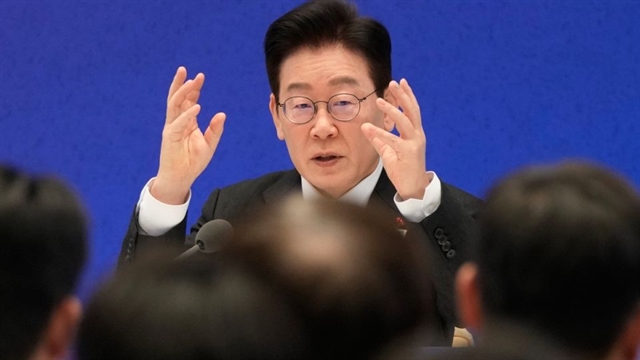Viet Nam News PARIS — French president-elect Emmanuel Macron’s party on Thursday unveiled more than 400 candidates who will stand in parliamentary elections in June, with half of them newcomers to politics and half of them women.
Pro-Europe centrist Macron, 39, was elected on Sunday after promising a "revolution" that would bring fresh faces into France’s stale political landscape and end the pattern of power alternating between traditional parties.
His newly renamed grassroots movement, La Republique en Marche (Republic on the Move), founded only 13 months ago, revealed 428 out of 577 candidates who will stand in parliamentary elections in June.
"We aim to build a majority for change and to win an absolute majority in parliament for La Republique en Marche (LREM) in the National Assembly," party secretary general Richard Ferrand told a news conference.
Macron had promised that half would be newcomers, meaning a diverse range of figures from business, public service, activist groups and academia will get a chance to seek their first ever elected office.
"The promise of renewal is fulfilled," Ferrand added at the news conference, adding that the average age of the candidates was 46 compared with 60 in the current national assembly.
On the tricky decision of whether to accept former Socialist prime minister Manuel Valls, Ferrand said the party had not selected him, but would not field a rival against him in his constituency south of Paris.
Valls, a friend-turned-foe of Macron’s from their time in government from 2014-2016, had asked to be selected on Tuesday.
Other successful bids came from a woman fighter pilot who will run in eastern France and a man born in Rwanda who was adopted in France at the age of four and will contest a seat in Brittany.
The nomination process is a balancing act for Macron and represents major risks for his presidency, which will begin formally on Sunday when he takes over from Socialist Francois Hollande.
Without his own parliamentary majority, he will find it hard to push through his planned reforms of the labour market, pensions, unemployment benefits or education.
Many of his newcomers will also face seasoned politicians with long careers and local networks of activists and supporters.
And there is also the risk of scandal if anyone with a chequered history slips through the vetting process of the more than 19,000 applications sent online since January.
Ferrand said each candidate had been interviewed and had declared not to have a criminal record or to have been disqualified for any function in the past.
"Our movement has done everything possible to make sure that the candidates chosen respect our values," Ferrand added.
Appeal to the right?
The president-elect is a left-leaning liberal - a one-time Socialist party member - and was a senior advisor to Hollande and an economy minister during his unpopular term.
Among the 214 politicians selected as candidates include a number of familiar faces from the Socialist Party and from the centrist MoDem party, headed by Macron ally Francois Bayrou.
There are none from the rightwing Republicans party, according to Republicans secretary general Bernard Accoyer, but Ferrand left the door ajar for some of them to join in the next week.
There remain another 149 constituencies - 148 excluding Valls’ area - that remain open.
Macron, a former investment banker who has never held elected office, faces other tricky decisions this week.
The biggest among them is his choice for prime minister, who will head the government until at least the parliamentary elections on June 11 and 18 and perhaps beyond.
The choice will send a strong signal about Macron’s intentions, and he has promised to pick someone with past experience of parliament and capable of managing a majority. His declared preference is for a woman.
Amid feverish speculation in the French media - will he pick a loyal supporter or someone from the rightwing Republicans? - nothing has leaked from his small group of aides.
Mushrooming movements
The political consequences of Macron’s victory are still being felt, with the Socialists fighting for relevance and the Republicans eager to become the main political force in parliament after the June elections.
Seeking to emulate Macron’s route to power outside the traditional parties, defeated Socialist presidential candidate Benoit Hamon has announced his own movement, as has a separate group of Socialists including Paris Mayor Anne Hidalgo.
Far-left presidential candidate Jean-Luc Melenchon is also hoping for a breakthrough in the coming elections with his "France Insoumise" ("France Unbowed") alliance, underlining France’s political fragmentation. — AFP
 World
World






